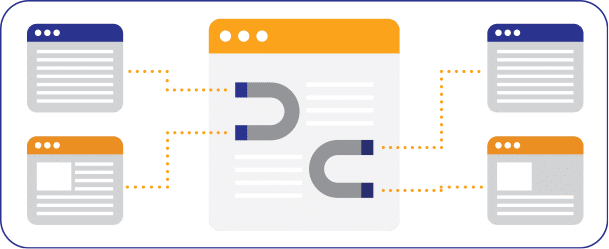Drug Rehab Marketing: The Ultimate Guide
Effectively marketing your treatment center is about more than the bottom line—it can literally make the difference of life and death for your clients.
People suffering from the terrible disease of addiction cannot receive the help they need if they don’t know it even exists, and not knowing where to seek treatment is a common reason that people don’t.
Effectively marketing your treatment center makes your services available to a larger population, keeps your admissions roster full, and lets you continue to offer this life-changing service for the people who need it most.
We know that creating a marketing plan for your treatment center can be overwhelming, so we’ve outlined the key components of a time-tested approach below. Bear in mind that marketing takes time, investment, and resilience. But if you stay the course, a solid marketing plan will result in a large return on your investment.
Quick Links
Search Engine Optimization (SEO)
The first and most important tool in a marketing strategy is search engine optimization (SEO). This strategy helps you to “rank” on the first page of search engine results for common searches relating to addiction treatment. Proper SEO can create a passive source of leads and general awareness of your treatment center.
SEO is by far the most effective tool you have to market your treatment center. In today’s digital age, search engines are often the first and last resource for finding medical care, advice, clothing, cars, accessories—and yes, substance use treatment.
By creating an online presence for your treatment center, you can reach the people who need treatment most and connect with them immediately.
SEO focuses on making your treatment center stand out from the competition. Using a constantly evolving set of techniques, SEO specialists can take your treatment center from obscurity to the first page of Google’s results.
There are three main focuses for an effective SEO strategy, which we’ve outlined below.
Creating Incredible Content
Great content is the backbone of any SEO strategy. Creating compelling content makes people stay on the page, explore your website further, and even recommend it to others. And when your content is keeping people’s attention, search engines take note.
Treatment centers usually focus on content creation in the form of a blog. People who are struggling with substance use disorders will often have questions about treatment, the effects of particular drugs, and how other people have achieved abstinence.
By answering these questions effectively on a blog, you draw visitors and increase your ranking in search engine results.
When creating content that you want to appear on the first page of search results, you need to incorporate three key elements:
EXPERTISE
Demonstrate your knowledge. Show people why they should believe the things that you have to say. This could mean doing substantial research, showing off your impressive credentials, or hiring professional writers in the substance use treatment field.
AUTHORITY
Your articles should speak with authority on the subject at hand. This isn’t the time for nuanced academic discussions—your job here is to provide answers to specific questions from a position of authority. Don’t hedge.
TRUST
Your online presence needs to be trustworthy. Making impossible claims or exaggerating your results doesn’t make you sound impressive. It makes you seem like a charlatan. Support your claims with data and be honest in your online marketing.
Making valuable content will motivate people to reach out to your treatment center when they decide they need treatment or are concerned about a loved one’s use. By building a strong online presence, you create an admissions highway that works around the clock, funneling people toward your intake team and getting them the help they need.
Targeting Keywords
Keywords bring focus to an SEO strategy by predicting specific search engine queries and building your rankings for those queries. Keywords like “substance use treatment” or “best rehabs” are highly competitive, but targeting specific services that your treatment center provides can help your customers make an informed choice when they’re seeking addiction treatment.
Ask yourself:
What makes my treatment center unique?
What can I offer to people seeking treatment?
What questions do people seeking treatment need to be answered?
These are the questions that generate fantastic keywords to use in your SEO strategy.
If your treatment center focuses on treating clients with co-occurring disorders, for example, you might want to target the keywords “dual diagnosis treatment center” or “depression and addiction.” These keywords help to target the clients that you want and build your influence in a particular area of expertise.
Keywords can also help with localizing your business. Ranking highly for “San Antonio rehab” is a much easier task than ranking for “rehab” alone. By developing keyword strategies that target your potential client’s search engine queries, you can focus your marketing efforts most efficiently.
Building Backlinks
Backlinks, or links to your website found on other websites, help build your authority online. A backlink implies that your content is valuable enough to be shared, and search engines interpret this as a sign of trustworthiness. By building backlinks to your website, you enhance your website’s authority and should see it begin to climb the search engine rankings.
There are several ways to build backlinks organically. The most scaleable way is to provide an educational resource that appeals to a specific, niche audience. Identify a piece of content that you can create and distribute. The more resourceful and helpful, the better. Reach out to anyone in or out of your network and explicitly ask for them to share your content on their website.
Several online companies sell backlinks, but these should be avoided. Purchasing backlinks typically backfires, as search engines are intelligent enough to recognize that these links are not genuine, and this strategy will actually hurt your search engine rankings.
Another tactic to avoid is guest blog posting. Blogging for links has been explicitly called out by Google ambassadors multiple times as a tactic that should not be done.

Google Business Profile (Formerly Google My Business)
Creating a Google Business Profile puts you in charge of the impression your company makes online. When somebody searches for your treatment center directly on Google, your Google Business Profile takes center stage.
You can use this tool to show off the best parts of your treatment center, funnel potential clients to your website, and easily connect with people interested in your services.
In addition, creating a Google Business Profile will link your services to the area you serve. If somebody were to search for “substance use treatment near me,” your business would appear if you’re in the same area and your Google Business Profile is highly optimized. This makes the Google Business Profile a powerful source for local patients.
SEO Takes Time
As you can see, there are several elements to a successful SEO strategy. Many of these strategies won’t show results for months, but it is still the highest priority for any substance use treatment marketing plan. With the correct strategy and tactical execution, SEO is an investment that pays dividends given enough time and effort. 
Pay Per Click
If you simply don’t have the time for SEO marketing, you can pay search engines to advertise your treatment center’s website. In the short term, the cost of “Pay per click” advertising is much higher than an effective SEO strategy, but it will begin to show results straight away.
When you purchase advertising with a service like Google Ads or Bing Ads, your treatment center gets advertised across the web directly to people who have shown interest in substance use treatment.
Your ads will show up either on web pages that have turned on advertising services or directly on the search results page. Paid advertisement typically appears above organic search results, making your advertisements the first thing customers see. As its name implies, each time your advertisement is clicked you incur a fee.
There are significant drawbacks to pay-per-click advertising, however. The most glaring problem is that people tend to gloss over paid advertisements and instead click on organic search results.
The second problem is the cost—pay per click advertising commands a hefty fee, and you need to continue to pay for the entire duration of your advertising campaign.
If you choose to incorporate pay-per-click into your marketing strategy, using ad extensions is an effective strategy to increase the number of people who actually click your advertisement. Ad extensions include additional information such as a location, address, or phone number.
Social Media
Social media presence is an essential component of any marketing strategy. Your treatment center can have a profile for several different social media websites, including:
Facebook Linkedin-in Instagram Tiktok Snapchat-ghost
These unified platforms help to build knowledge of your treatment center within your community and the professional substance use treatment world. They can also complement your other marketing strategies by helping you promote your blog or providing a space for your alumni to reach out to each other.
Social media platforms are a means of building community. Your employees, clients, and alumni are all likely to participate in your social media, and it can be a great place for discussion and engagement. By having a strong social media presence, you increase brand commitment and can even gather word-of-mouth referrals.
It’s important to remember that social media websites are places to socialize. When building your profiles and engaging with others, you should not focus on direct advertising. Instead, use it as an opportunity to engage with your community and provide informative insights.
Retargeting
Another important component of a social media presence is “retargeting.” When most people visit your website for the first time, they aren’t necessarily interested in enrolling in treatment right away. They may be considering substance use treatment for the first time or just exploring their options for future treatment.
Retargeting is a strategy to funnel these people towards your website via social media advertisements, where they can keep your treatment center top of mind even if they’re not looking to enter treatment immediately.
If you are successful in retargeting website visitors, your treatment center will still be on their minds when they are finally ready to enter treatment. Instead of having somebody visit your website once and never return, you’ve created a long-term connection that resulted in a future admission.
Email Marketing
Email marketing is a low-cost strategy to keep your treatment center at the forefront of people’s minds. For substance use treatment centers, alumni are often the focus of email marketing campaigns. After graduating from your program, they are likely invested in your brand and interested in current developments.
An email marketing campaign can keep your alumni informed about changes in your treatment center, current events related to recovery, and local news about substance use.
By keeping in touch with your alumni, you open the door for word-of-mouth advertising when somebody they know is seeking treatment. In addition, emailing your alumni can drive traffic toward your website and could get your treatment center some positive reviews online.
But there’s another reason for email marketing campaigns targeted toward your alumni: you can provide informative messages about how to maintain sobriety after treatment. Recovery is a lifelong process, and keeping your alumni learning in their recovery is one of the best ways to ensure long-term abstinence.
Buying Leads
Buying leads for addiction treatment is possible, if done with the right vendor. Buying leads is typically very costly but could result in gaining several clients for your treatment center quickly. Typically, purchasing leads for addiction treatment is pay per call—for every lead they send to your admissions line, you get charged a fee.
There are ethical dilemmas with buying treatment leads, however. Certain companies that generate leads for treatment use unethical practices, deceptive advertising, or aggressive telemarketing. Others attempt to skirt regulators by charging you per admission. Use extreme discretion when selecting a vendor for purchasing treatment leads.
Outreach
Boots on the ground business development is a lucrative way to increase your admissions and spread awareness of your treatment center. There are countless ways you can incorporate business outreach into your marketing model, and hiring an outreach specialist might be just what your business needs.
There are several avenues you can explore for addiction treatment outreach:
Partnering with community events
Attending substance use treatment conferences
Reaching out to local physicians, therapists, or community members
Building relationships with other treatment centers
Making yourself known across the community spreads word-of-mouth about your treatment center and can substantially improve your admissions.
Networking with Other Treatment Centers
Outreach to other treatment centers could be much more lucrative than you might expect. It is important to remember that while you may be a competing business, your primary interest is in helping people to recover from substance use disorder. You share a common goal, even if a business mindset makes you view other treatment centers as competitors.
Other treatment centers can be a valuable source of admissions. For instance, if your treatment center primarily serves adults, you may benefit from networking with an adolescent treatment center.
When adolescents reach out to your admissions team for treatment, you can recommend them towards your connections at the adolescent center—and when adults come to them, they can do the same.
Or perhaps your primary competitor is at capacity but still has people calling for admissions. They may benefit from sending these clients to you if you reciprocate in the reverse situation.
Alumni
Your alumni are a valuable resource for marketing your treatment center. They are living proof of your treatment center’s effectiveness, and often know other people in the community that could benefit from addiction services. In all likelihood, your alumni already want to help these people to seek recovery. You simply need to provide them with an avenue to do so.
Since your alumni recommendations can make up a substantial portion of your admissions, it is vital that your intake and admission process be as welcoming and helpful as possible.
It might be tempting to have your admissions staff work hard to secure intakes, but applying too much pressure can leave a sour taste in people’s mouths, even if they ultimately admit to your center.

TV, Radio, and Streaming Advertisement
TV, radio, and streaming advertisements are excellent choices for traditional advertising. Selecting the right place, time, and media to present are important considerations when using these methods, but we have a few tips that may help.
For TV, substance use treatment centers can benefit from the lower cost of late-night ads. People struggling with addiction and seeking help are often awake until the early hours of the morning, meaning purchasing these lower-cost ads could target your intended audience directly.
Similarly, late-night advertising on radio stations could be a beneficial option. Radio advertising is relatively cheap, and you can build your presence in your community with this option.
Podcasts, YouTube, and streaming audio services are also excellent avenues to connect with customers. Just be mindful of where you choose to advertise: while a pop culture podcast might have a large audience, you may be able to better target your advertising to media that is focused on mental health or recovery.
Admissions Optimization
Optimizing your admissions process can substantially improve your ability to turn leads into admissions. You want to ensure that calls convert, that your representatives who get the most admissions get rewarded, and that you are tracking the metrics of your intake center.
Here are a few questions related to key areas that can always be improved in the admissions process:
How long does it take your team to follow up on admission inquiries?
What are your representative’s conversion rates?
How many first calls result in an admission?
How much time are potential customers being put on hold or waiting in a queue?
To truly optimize and improve your admissions, you need to be collecting data and analytics on the entire intake process. From how often your website gets clicked in search results to the percentage of calls that convert into admissions, raw data can guide you on how best to improve your admissions rate.
Analytics
So you have started a marketing campaign for your treatment center. You are building an online presence with search engine optimization, creating communities through social media, employing outreach strategies with other businesses, and working with your alumni to generate new leads.
How do you know if any of this marketing is paying off?
The key is accurate measurement and analytics. Analytics play a pivotal role in any marketing strategy because they let you know what works and what doesn’t. Without closely tracking your progress, you could end up spending tens of thousands on marketing campaigns that simply don’t get results.
This is where tools like Sunwave Health’s Customer Relationship Management (CRM) platform come into play. Our CRM software helps you optimize the admission process, minimizes time spent on tedious work like verifying benefits, and tracks metrics across a wide range of marketing strategies.
- Track where your admissions are being referred from
- Give you detailed information on your representative’s performance
- Measure revenue by the source, letting your team know what works and what does not
- Identify areas that need improvement
- Create dynamic reports to analyze your marketing campaign’s success
- Eliminate duplicate effort
You can determine your overall return on investment and help you to focus your marketing efforts where they are most beneficial and efficient.
In addition, our CRM pairs effortlessly with other Sunwave Health products. Electronic Medical Records, Revenue Cycle Management, and Alumni Management software can all work together on a single platform to streamline the path of a patient lifecycle from admissions through clinical and billing while also boosting KPIs.
Make Your Marketing Plan Work Together
This guide has shown you the most powerful tools to develop a rock-solid marketing plan for your treatment center. Making a marketing plan work together means incorporating several elements and letting them work together to increase your admissions.
Excellent SEO will drive people toward your social media sites, an optimized admissions center will encourage alumni recommendations, and powerful analytic tools like Sunwave Health’s CRM platform can help you determine where your marketing dollars are best spent.
A marketing strategy doesn’t have to be heartless advertising to manipulate people into admissions. Instead, it can be an effective tool for letting people know where they can receive help.
When your marketing approach is successful, you can get back to the work that made you start a treatment center in the first place: helping people break free from addiction.



